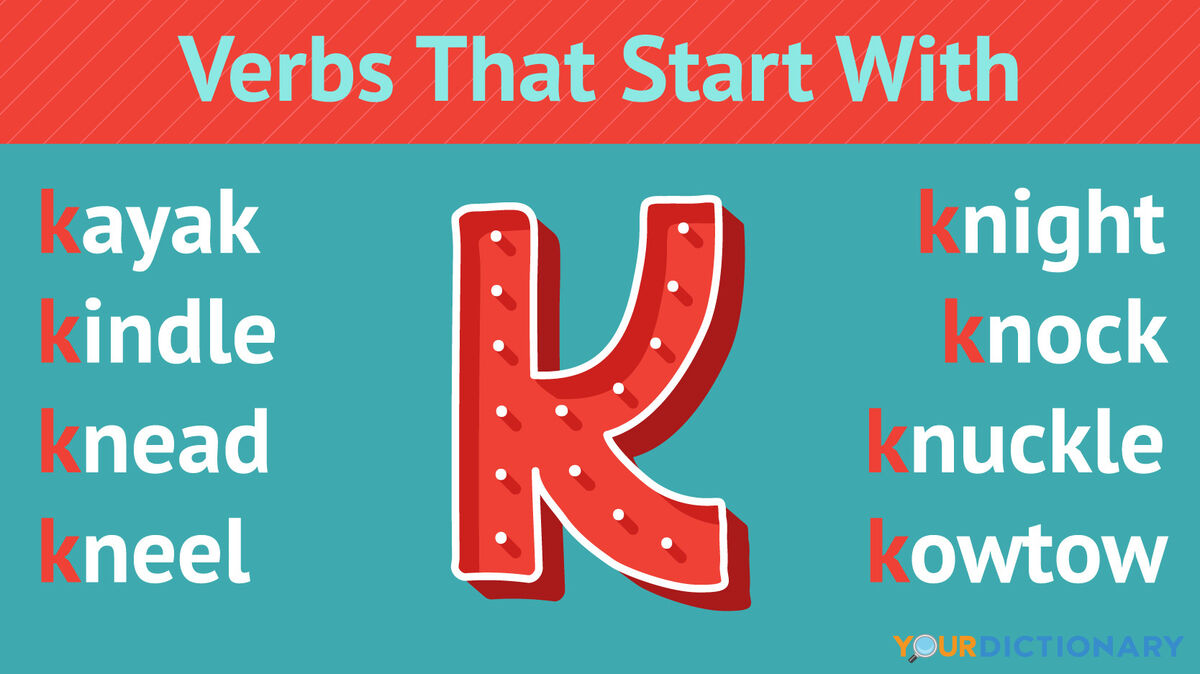
As you knuckle through life and refuse to kowtow to writer’s block, there’s one thing you can always do — maintain a robust vocabulary list. If you keep a list of fascinating words by your side, it’ll help you battle through those moments when the words refuse to come. Verbs that start with "k" might not be the most popular verbs on the block, which is precisely why they may make your next piece of creative writing a king-sized accomplishment. Read on to enjoy 25 "k" verbs for your literary arsenal.
25 Verbs Starting With K
Verbs express action or a state of being. In English, every word has a specific place and plays a specific role within a sentence. As such, verbs usually come after the subject of the sentence and before the object of the sentence. For example, "Kaylee kayaked to the pier." In this sentence, "Kaylee" is the subject, "kayaked" is the verb showing action and "pier" is the object receiving the action of the verb.
Ready to explore more "k" verbs? Have some fun exploring this list. You’ll notice you can use several of these words as nouns, including knife and knuckle. However, they can also be turned into action words.
| Verb | Definition |
| kayak | to travel on a body of water by a light, slender boat with pointed ends |
| keel | to fall or collapse |
| keen | to sharpen or make cold |
| keep | to hold or retain something |
| ken | to know something |
| key | to fasten or lock with a key or wedge |
| kick | to strike or hit with a foot or feet |
| kid | to tease or deceive in a fun way |
| kidnap | to seize a person against their will |
| kill | to cause to die |
| kindle | to start a fire, flame or light |
| kink | to make bends in something that’s usually straight |
| kip | to sleep |
| kiss | to lightly touch with the lips |
| kit | to provide what is needed for a given task or situation |
| knead | to work or massage something with your hands, especially dough to make bread |
| kneel | to rest on one or both knees |
| knife | to stab someone using a tool with a handle and a sharp, metal blade |
| knight | to give honor from the monarch of England for their achievements |
| knit | to join together interconnecting loops of yarn in rows or stitches |
| knock | to rap on a door |
| knot | to securely tie a rope or ribbon |
| know | to be familiar with someone or something |
| knuckle | to strike with the knuckles |
| kowtow | to be subservient to someone |
10 Example Sentences For Verbs That Start With K
Now that you know a few "k" verbs, it's time to look at how you can use them in a sentence.
- The badger simply keeled over and died.
- He told her to keep the engagement ring after she called off the marriage.
- He kicked the A/C unit to get it started.
- Don’t kid with her in that way.
- Unfortunately, all I do is kill houseplants.
- Let’s kindle the campfire flames.
- To make her laugh, he’d always kiss the dog on its nose.
- Can you knead the dough while I marinate the chicken?
- I knitted a new wool sweater.
- Even though it was difficult, we knuckled through it.
Types of Verbs
When it comes to "k" verbs, they come in all different types. Dive into a few different examples of verbs.
Action Verbs
The largest category of verbs is action verbs. Action verbs, also known as dynamic verbs, express the action of the sentence, whether physical or mental. For example, "She knocked on the door." You can also check out a more thorough list of action verb examples.
Linking Verbs
Another category of verbs is linking verbs. Linking verbs are typically "to be" verbs, as in "am," "is," "are," "was," and "were." They link the subject with more information. For example, "She knows him."
Regular Verbs
Regular verbs change from present tense to past tense with the simple addition of -ed at the end. For example, "She didn't know how to knit a sweater so she knitted a scarf."
Irregular Verbs
Irregular verbs, however, do not follow the same -ed rule as their regular verb counterparts. To conjugate any irregular verb from present tense to past tense, you simply have to memorize them. To see this in action, look at an example: "They couldn't keep the puppy, but they kept the kitten." Be sure to review this list of irregular verbs to commit some of the most popular ones to memory.
Kindling for the Fire
A robust vocabulary is kindling for your literary fire. The more you can pull interesting words from your memory bank, the more you’ll be able to spruce up your writing. While we’re on the "k" train, how about a couple of adjectives that start with the letter "k"? Or explore all the parts of speech via a wide range of words that begin with "k." The new "k" words you discover just might make you keen to pick up the pen and start writing again. If you are ready to move past "k," then look at the verbs that start with "j."